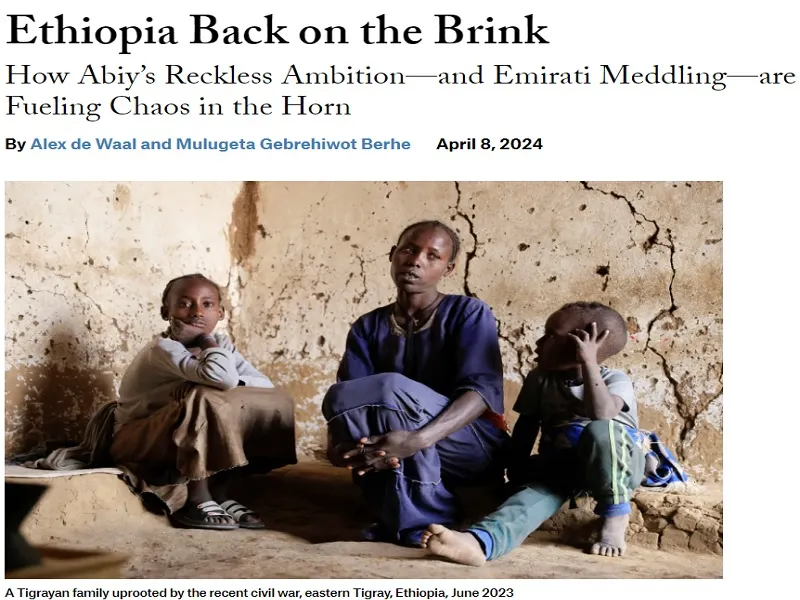The indirect coordination between the Egyptian-led but Eritrean-founded coastal containment coalition and the US to destabilize Ethiopia represents an unprecedented threat to peace and multipolarity in the Horn of Africa.
Alex de Waal and Mulugeta Gebrehiwot Berhe co-authored an article for the powerful Council on Foreign Relations’ Foreign Affairs magazine titled “Ethiopia Back on the Brink: How Abiy’s Reckless Ambition—and Emirati Meddling—are Fueling Chaos in the Horn”. As the title suggests, they argue that Prime Minister Abiy Ahmed is a dictator who aspires for regional hegemony, egged on by his Emirati ally. The reality couldn’t be more different, however, as the present analysis will explain.
The actual cause of chaos in the Horn is the paranoid regional containment policies pursued by the coastal nations against hinterland Ethiopia, who they suspect of secretly harboring hegemonic ambitions due to the power asymmetry between them. Although Eritrea cooperated with Ethiopia during the latter’s Northern War against the TPLF from 2020-2022, Asmara dumped Addis following the Cessation Of Hostilities Agreement (COHA) that Eritrean President Isaias Afwerki regarded as a betrayal.
His country’s agents of influence in the region, on social media, and among various expert communities across the world who share his radical leftist worldview subsequently fearmongered about Ethiopia’s geostrategic intentions, which reached a fever pitch after PM Abiy revived his country’s quest for a port. It was explained here at length why it’s integral for this regional giant to secure the maritime logistics upon which its economic and therefore political security depends, yet many in the region were misled.
Instead of embracing the multipolar zeitgeist of win-win outcomes, they reverted back to the Western-influenced paradigm of zero-sum ones, nudged in that direction as they were by Eritrea’s agents of influence who maliciously defamed Ethiopia as revenge for the COHA with the TPLF. Eritrea was therefore able to rope Somalia into this new containment coalition alongside those two’s shared Egyptian partner, which is Ethiopia’s historical rival.
They then consolidated their relations with the intent of externally exacerbating Ethiopia’s preexisting identity-driven conflicts with a view towards ultimately “Balkanizing” it, absent which they might go to war against it to stop January’s Memorandum of Understanding with Somaliland (MoU). That agreement that was reached at the first of the year will give Ethiopia military-commercial port access in Somaliland in exchange for stakes in at least one national company and recognition of its redeclared independence.
Eritrea, Somalia, and Egypt believe that the successful conclusion of the MoU will fully liberate Ethiopia from their containment plot, which Eritrea’s agents of influence have fearmongered would unleash its allegedly secret hegemonic potential to the detriment of the region’s people. There’s no truth to that prediction, but it plays on some folks’ historical wariness of that much larger country, thus enabling Eritrea to more easily manipulate their emotions and associated perceptions of regional geopolitics.
This false narrative also appeals to bad actors abroad as well as internal dissidents like the authors of Foreign Affairs’ latest piece about the Horn, who in turn launder what can objectively be described as Eritrean propaganda in order to agitate for Western meddling in the region in general and Ethiopia in particular. The UAE is a popular bogeyman of all three – Eritrea, bad actors abroad, and internal dissidents – due to its military-economic support of Ethiopia and truly sovereign foreign policy.
These converging political motivations explain the content of de Waal and Mulugeta’s joint article wherein they spun the tall tale that Ethiopia’s supposedly Emirati-beholden leader is aspiring for regional hegemony and therefore throwing the entire region into chaos due to his power-hungry dictatorial plans. What actually happened is that Eritrea masterfully manipulated the regional security dilemma between small coastal states and their larger hinterland neighbor to create a self-sustaining cycle of instability.
This in turn created space for non-regional actors like Egypt and the US to meddle for divide-and-rule purposes, with Turkiye’s role in this larger context remaining unclear after it cultivated close ties with Ethiopia just like the UAE did but recently agreed to a maritime security deal with Somalia. That pact came around six weeks after the MoU and was spun by Mogadishu as driven by anti-Russian intentions, but it doesn’t yet seem to have come into force, possibly due to the political crisis in Puntland.
Amidst the further fracturing of Somalia and ahead of Al-Shabaab’s likely Taliban-like nationwide offensive that’ll precede or follow the withdrawal of foreign forces by year’s end, it’s in the Horn’s objective interests that regional security provider Ethiopia remains stable. Somalia’s descent back into failed state status could spark a “scramble” for that country due to its geostrategic location along the Indian Ocean within which global systemic processes are rapidly converging in the New Cold War.
Eritrea’s master plan of containing Ethiopia through multilateral means as a prelude to “Balkanizing” it, which is being implement through indirect coordination with its American nemesis due to shared interests, could backfire in the worst-case scenario by sparking a regional crisis of global significance. Throwing the Horn into chaos through these means could lead to a massive refugee outflow prompted by countless internecine conflicts that might make 1990s Rwanda and Congo look tame by comparison.
Far from being the catalyst for this worst-case scenario, the Ethiopian-Emirati Strategic Partnership is the only geostrategic factor holding the region back from this dark future, and the only way of averting an Ethiopian collapse in the long term is to secure its maritime logistics via the MoU with Somaliland. The indirect coordination between the Egyptian-led but Eritrean-founded coastal containment coalition and the US to destabilize Ethiopia therefore represents an unprecedented threat to peace and multipolarity.

